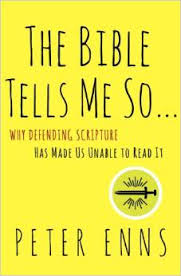Here is my second post on my reaction to the RNS interview with Paul Copan and Matthew Flannagan about their recent book Did God Really Command Genocide?: Coming to Terms with the Justice of God. (The first post is here. I may add a third and final post later this week.)
Based on some comments to my first post, one of which by one of the authors (Flannagan), I want to be clear that I am responding to the interview. I assume the authors are saying what they mean, but I also understand only too well that books nuance things differently that interviews can. I am very conscious of not wanting to misrepresent their arguments. I hope how I word things below will make that even clearer, and if there are points where a fuller reading of the book would correct or nuance my impressions formed by the interview, by all means, in the interest of truth, let others say so.
In the previous post I looked at how the Israelite evaluation of the Canaanites’ wickedness is hyperbolic and propagandistic. Here I want to touch on a related point that Copan and Flannagan also address in the interview: complete annihilation is also hyperbolic and part of ancient propagandistic rhetoric.
Other peoples engaged in similar rhetoric, and the go-to example is the Mesha Inscription, a.k.a. Moabite Stone, which speaks similarly of the Moabite “extermination” of the Israelites in the 9th century, even using the same word we find in the Old Testament, Hebrew cherem, often translated “ban.”
Israel was not alone in describing military victory as utter and complete annihilation with the vanquished never to be heard from again, wiped off the earth, etc. Of course, the Moabite report of Israel’s demise was highly exaggerated–as was the Israelite report of the Canaanites. (One big difference, however, is that the Mesha inscription was a monument commemorating King Mesha’s deeds and thus likely commissioned my him, i.e., fairly near the time of the events. The Bible does not give us any Israelite king’s self-description in “real time,” but the evaluation of the past by later storytellers.)
Losing a battle or achieving only partial victory would be blamed on some offense toward the nation’s high god and only appeasing that god will turn the military tide. This too is mentioned in the Mesha Inscription, as it is in Judges 6-7, where the failure to capture Ai is attributed to Achan’s sin and victory over Ai only comes when Achan and his family are annihilated (i.e., treated the Canaanites).
The Israelite writers were engaged in propaganda as much as others.
As I argue (along with biblical scholars in general) in The Bible Tells Me So, the hyperbolic nature of Israel’s accounts combined with the extremely unfavorable archaeological evidence for a conquest of any sort suggests that “the conquest” didn’t happen. The biblical accounts reflect later storytelling of perhaps ancient battles and tribal tensions (which may or may not have involved early Israelites.)
What I sense, though, from the interview is that the moral offense of Canaanite annihilation can be turned down a bit because the accounts are simply exaggerations of what happened: Israel conquered Canaan through military invasion and subjugation, but not total, mass, extermination.
In other words, since it’s not technically genocide, it’s not so bad. Not everyone was killed.
Which brings me back to a recurring theme in my own thinking: “it’s not so bad” doesn’t change all that much. In the Bible, God still orders mass killing (which in Deuteronomy 20 “mass” includes everything that breaths, including women, children, and animals; and not to mention enslaving women and children as spoils of war).
A less-than-total annihilation of the Canaanites to take over their land still presents moral challenges for readers of the Old Testament. Further, warring continues (Judges 1-2), and according to Judges 3:1-2, it was the Lord’s doing to intentionally leave some Canaanites in the land so that subsequent generations of Israelites could get some experience in war.
It seems that line of argument the authors take is driven by a non-negotiable assumption: that a “Canaanite conquest” is basically historical–it happened, only on a lesser scale. This is where I think I am most eager to be corrected if wrong about the authors.
But if that is their point, for their argument to be convincing, the broader sweep of biblical scholarship (i.e., outside of evangelical defenses of historicity) would need to be addressed, where the entire question of Israel’s origins (conquest of Canaan being only one part of that) has been entirely reframed through archaeological investigations and literary analysis of the Old Testament.
Although such an explanation might not sit well with everyone (and I get why), it would completely reframe the matter: the stories of the conquest of Canaan and the extermination of the Canaanites would reflect Israel’s understanding and interpretation of the significance of these (for the writers) ancient events, which in a tribal context they would understandably attribute to God’s command.
I can’t tell from the interview whether Copan and Flannagan argue or hint in this direction–though, my sense is they would not go this far, since doing so would take them outside of mainstream Evangelical theological boundaries. I would need to read the book, though, to see if reasons other than dogmatic requirements are driving their thinking on this important matter.















